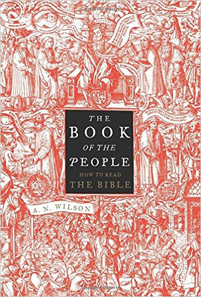 A.N. Wilson, The Book of the People: How to Read the Bible (New York: Harper, 2016), 212pp.
A.N. Wilson, The Book of the People: How to Read the Bible (New York: Harper, 2016), 212pp.
When A.N. Wilson (b. 1950) entered St. Stephen's House at Oxford University, he planned to become an ordained priest in the Church of England. That lasted just a year, until he renounced his faith and focused on a career in writing — which, in retrospect, now having published nearly fifty books in a prolific and award-winning career, seems to have been a good vocational choice.
After attending church all his life, Wilson became what he calls a "born again atheist." For thirty years he was a well known and outspoken sceptic: "I had become like one of the Billy Grahamites, only in reverse." In 1991, he published a pamphlet called Against Religion: Why We Should Live Without It.
Then came his re-conversion. In 2009, Wilson published an essay in the New Statesman and the Daily Mail called "Why I Believe Again" (see below). Religious belief, he came to understand, isn't primarily about who has the best intellectual arguments, pro or con. Religion concerns the whole person, and in particular those deeply mysterious and meaningful aspects of being fully human — like music, love, language, and ethics, that a strictly materialist point of view fails to capture.
Wilson's newest book, he writes, "is an attempt to persuade people to read the Bible." But how should we do that? In his view, both liberal critics and conservative defenders make the same mistake. They read the Bible like it was an "archaeology" expedition, finding either more or less reliable historical evidence with which to accept or reject the faith. But the quest to find the historical Jesus behind the Christ of faith is, says Wilson, a "dead end that goes nowhere" and a "doomed enterprise." The ancients never intended to write "dispassionate history."
We should read the Bible not as a puzzle to solve but as a mysterious encounter with the living God who speaks in its pages. This is what millions of people down through the centuries and all over the world have done. Wilson adopts what he calls a "semi-fictional" form to make his point. He recalls memories, characters, incidents, and especially a "God-stricken" friend whom he calls "L," to describe his own encounters with the Bible.
Reading the Bible is primarily an act of the imagination, says Wilson. In his own experience, that means recalling the conversion of Simone Weil while reading the intensely Biblical poetry of George Herbert, architecture like Hagia Sophia, the engravings of William Blake, the lectures by the literary critic Northrop Frye, and the incarnation of the word by social prophets like Martin Luther King, Jr.
I loved this book. In addition to his remarkable erudition, Wilson writes with both wit and modesty. For those of us who are overly familiar with the Bible, and for whom it has become a tired text, or for those who dismiss it for all the wrong reasons, this book is a blast of fresh air.


